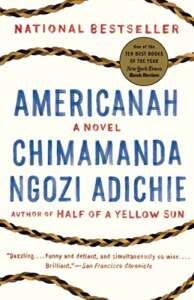 Discussion questions for Americanah by Chimimanda Ngozi Adichie
Discussion questions for Americanah by Chimimanda Ngozi Adichie
- What did you think about Ifemelu’s blog? Did including blog posts add to or detract from the narrative? Do you agree or disagree with The Guardian‘s reviewer that “…the blogposts add an extra dimension to the plot, allowing the reader to see how Ifemelu sees herself and how she wishes to present herself to the outside world.”
- The New York Times‘s reviewer argues that: “Ifemelu and Obinze represent a new kind of immigrant, ‘raised well fed and watered but mired in dissatisfaction.’ They aren’t fleeing war or starvation but ‘the oppressive lethargy of choicelessness.’” How would the book have been different if they were “refugees” rather than “immigrants”.
- The New York Times‘s reviewer goes on to say that: “Where Obinze fails, Ifemelu thrives, in part because she seeks authenticity. Never has Ifemelu felt as free as the day she stops hiding her Nigerian accent under an American one, the accent that convinces telemarketers she is white. She refuses to straighten her hair, even if she must endure muttered disparagements from African-Americans when out with a white man — ‘You ever wonder why he likes you looking all jungle like that?’” Do you agree or disagree with this assesment of the main difference between them.
- NPR’s reviewer says that: “Americanah is indeed a novel about being black in the 21st century — in America, Great Britain and Africa, while answering a want ad, choosing a lover, hailing a cab, eating collard greens, watching Barack Obama on television — but you could also call it a novel of immigration and dislocation, just about every page tinged with faint loneliness. Alternatively, it could be read as an exuberant comedy of manners about the foibles of Senegalese salon workers, pretentious African-American bohemians, Old Money Boston liberals, and artsy white lesbians who wear ugly thrift store dresses.” What do you think this book is “about”? Recall the scene where Ifemelu is asked at the hair salon what her book is about, and she thinks “As if a novel [has] to be about only one thing.”
- Do you feel, as The Guardian‘s reviewer does, that “the sense of dislocation felt by both characters [Ifemelu and Obinze] in two countries with wholly different histories and class structures is expertly rendered.” Compare Ifemelu’s experience in the US to Obinze’s in the UK.
- The Washington Post‘s reveiwer felt that, “Americanah is unique among the booming canon of immigrant literature of the last generation (including writers Junot Diaz, Jhumpa Lahiri, Gary Shteyngart, Chang-rae Lee, Dinaw Mengestu and Susan Choi). Its ultimate concern isn’t the challenge of becoming American or the hyphenation that requires, but the challenge of going back home.” Did you get that sense as well? Do you think Ifemelu would agree that “you can never go home again”?
- The reviewer for The Wall Street Journal was less positive about the book: “The lethal problem in Americanah is that it establishes little authorial separation from Ifemelu. Her snap verdicts go unchallenged; while devoting so much time to calling out prejudices in others, the novel unquestioningly endorses those of its protagonist… It’s typical of this exasperating novel that it expects such a narrow, self-serving romance to kindle interest. Americanah uncritically esteems [Ifemelu and Obinze] and thinks harshly of everyone else. The reader will have the opposite reaction.” Does this reflect your view of the book?
For more questions, check out the publisher’s resources.

